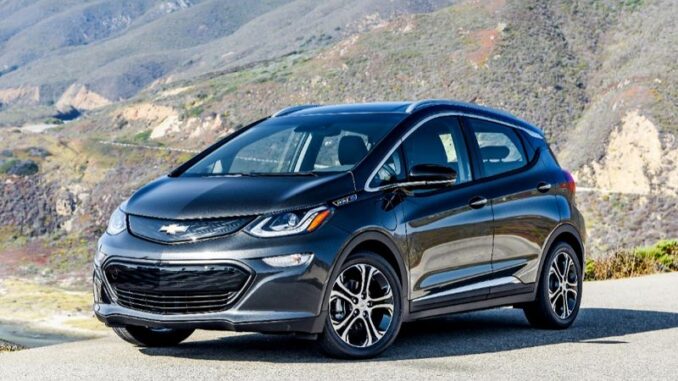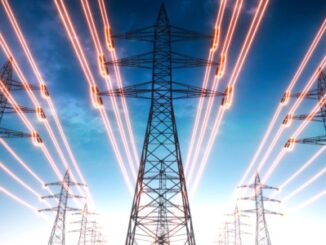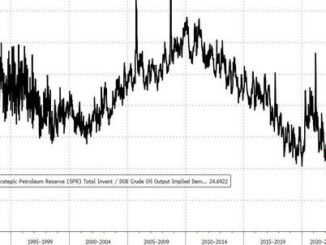
Biden has ordered the federal government to buy electric vehicles made in America with union labor. There’s just one problem: No such vehicles exist.
Tesla Inc., the leading U.S. electric vehicle manufacturer, has several American-made models, but it isn’t unionized. And while General Motors Co. employs union labor to make the electric Chevrolet Bolt, roughly three-quarters of its components come from outside the U.S. — missing the 50% threshold to be considered American-made under federal procurement law.
To be sure, Biden’s executive order, issued Wednesday, is designed to spur investment in the nascent plug-in car market and didn’t come with a deadline. So there’s time for automakers to adjust. Two of them — General Motors and Nissan Motor Co. — announced commitments this week to produce carbon-neutral fleets in coming decades. Ford Motor Co. has previously pledged to become carbon neutral by 2050.
And with a U.S. government fleet of 645,000 vehicles — only 3,200 of which are electric — there’s plenty of incentive.
“Do I think GM and Tesla will contort to access a big U.S. government market? Yes I do,” said Scott Sklar, director of sustainable energy at the George Washington University’s Environment & Energy Management Institute. “They follow the money.”
Biden’s push could also help drive more domestic electric vehicle — or EV — manufacturing overall, given the scale of the government’s annual vehicle acquisitions, said Sam Ori, executive director of the Energy Policy Institute at the University of Chicago.
“The federal government acquires 50,000 to 60,000 new vehicles a year, and, in an EV market where you’re looking at 300,000 to 350,000 units a year, an additional several tens of thousands could have an impact for manufacturers,” Ori said.
Plug-in cars account for about 1% of U.S. car sales and 2.6% of global auto sales, according to the Paris-based International Energy Agency.
Currently, the Chevrolet Bolt is the only electric car on the United Auto Workers’s 2021 Union-Built Vehicle Guide, which identifies vehicles that are made in the U.S. or Canada by members of the UAW or Canada’s Unifor union.
Brian Rothenberg, a UAW spokesman, expressed confidence that unionized auto workers will be able to ramp up production to meet the federal government’s level of demand for electric cars.
“The UAW has been working closely with the Biden transition team and now the administration on policies regarding the shift from combustible engines to EVs,” Rothenberg said in an email.
Rothenberg said it will be some time before the transition occurs, but it’s important that Biden “agrees with our position that these new jobs replacing combustible engines are union wage and benefit jobs that are created right here in the U.S.”
Only 24% of the parts used in the Bolt, GM’s primary electric car offering, came from the U.S. and Canada, which is defined as domestic under the American Automobile Labeling Act, according to 2020 data from the National Highway Traffic Safety Administration. Most of the parts come from South Korea.
Electric Future
“We are excited that President Biden shares our enthusiasm for American manufacturing as well as electric vehicles,” Jeannine Ginivan, a spokeswoman for GM, said in a statement. “Adding EVs to government fleets and the needed infrastructure to support them is a great way to get more EVs on the road as we work towards a zero-emission, all-electric future.”
The Nissan Leaf, which is built at a non-union plant in Smyrna, Tennessee, uses 35% domestic parts. Tesla has several models above 50% for domestic content that it makes in Fremont, California, without union labor: the Model X is 55%, the Model Y and Model S are 60%. Ford came out with an all-electric Mustang Mach-E this year, but it’s being built in Mexico and China.
Spokespeople for the White House and General Services Administration declined to comment on the ability of carmakers to fulfill Biden’s pledge.
Under longstanding federal law, U.S. agencies are directed to purchase domestic products — a status that applies only to manufactured goods where more than half the value of their components are produced in the U.S. Biden on Monday signed an order directing a federal panel to tighten standards defining American-made products to ensure they are manufactured with a higher percentage of U.S. components and labor.
“Right now if you manufacture a vehicle for the federal government, you need to show that at least 50% of the components of that vehicle were made in America,” Biden said Monday in announcing his Buy-America initiative. But, he said, loopholes allow cars to meet the criteria even if the most valuable parts, including the engine and steel, is made overseas.
Bush, Obama
Biden isn’t the first president to try cleaning up the government’s vehicle fleet. Former President Barack Obama also focused heavily on trying to buy more electric vehicles. And before Obama, President George W. Bush was pushing the same.
Those efforts ran into challenges overhauling a government procurement system that naturally favors cheaper acquisitions. The mandate to save money generally gives conventional, gas-fueled vehicles an edge over electric models.
And the variety of the government fleet — which ranges from small, compact cars to tactical utility vehicles and heavy-duty trucks — also means the solution isn’t one-size-fits-all.
“The federal fleet is extremely diverse,” the University of Chicago’s Ori said. “If you have this idea of someone going and buying a bunch of Nissan Leafs or something, that’s not going to satisfy the requirements for the federal fleet.”
To succeed, Ori said the Biden administration will “have to figure out the procurement problem, but even once that’s solved, there’s a ton of analysis that’s going to have to be done, agency-by-agency” to match up “vehicle technology with vehicle needs.”
Biden’s pick to be energy secretary, former Michigan Governor Jennifer Granholm, said the agency, which spends billions of dollars on the research and development of technology, would be playing a major role to meet the Buy American requirements outlined in the executive order.
“We can buy electric car batteries from Asia or we can make them in America,” Granholm testified during her Senate confirmation hearing Wednesday. She said she was the proud driver of a Chevy Bolt. “I drive on sunshine.”





